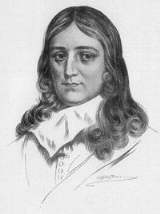
under Oliver Cromwell
. He wrote at a time of religious flux and political upheaval, and is best known for his epic poem
Paradise Lost
.
Milton wrote in Latin, Italian and English, and had an international reputation during his lifetime. His poetry and prose reflect deep convictions and addressed urgent, contemporary issues (for example, his celebrated Areopagitica
is written in condemnation of pre-publication censorship).
After his death, his critical reception oscillated, a state of affairs that continued through the centuries.
And so sepúlchred in such pomp dost lie,That kings for such a tomb would wish to die.![]()
How soon hath Time, the subtle thief of youth,Stol'n on his wing my three-and-twentieth year.![]()
Captain or Colonel, or Knight in Arms,Whose chance on these defenceless doors may seize,If ever deed of honour did thee please,Guard them, and him within protect from harms.![]()
The great Emathian conqueror bid spareThe house of Pindarus, when temple and towerWent to the ground.![]()
Such sweet compulsion doth in music lie.![]()
Under the shady roofOf branching elm star-proof.![]()
The lazy leaden-stepping Hours,Whose speed is but the heavy plummet's pace.![]()
O nightingale, that on yon bloomy sprayWarbl'st at eve, when all the woods are still.![]()
Blest pair of Sirens, pledges of Heaven's joy,![]()
Where the bright seraphim in burning rowTheir loud uplifted angel trumpets blow.![]()

